|
|
|
Sort Order |
|
|
|
Items / Page
|
|
|
|
|
|
|
| Srl | Item |
| 1 |
ID:
179278
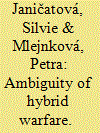

|
|
|
|
|
| Summary/Abstract |
Since the annexation of Crimea in 2014, hybrid warfare has become a widely used yet ambiguous term to describe Russia's hostile activities. In academic publications and policy documents, there have been a plethora of different definitions and concepts to make sense of hybrid warfare. This article takes a bottom-up approach and analyzes the discourse of political and military representatives in the United Kingdom to explore how they understand hybrid warfare by Russia and what the implications are for defense policy. Using qualitative content analysis with quantitative aspects, the results show not only a range of different terms used to describe Russia's hostile activities, but also that the discussed topics do not reflect one particular definition of hybrid warfare. The analysis further reveals that representatives highlight non-military aspects of hybrid warfare over the military ones and consider the role of defense policy dependent on the nature of a particular hybrid threat.
|
|
|
|
|
|
|
|
|
|
|
|
|
|
|
|
| 2 |
ID:
185227
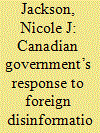

|
|
|
|
|
| Summary/Abstract |
In recent years, governments have considered how to respond to “disinformation.” However, there is little academic literature on Canada’s response in the area of security and foreign policy. This paper addresses this gap by analyzing how and why Canadian government foreign and security actors have “securitized” foreign disinformation. It argues that, since 2014, they have increased awareness about disinformation and transformed it into a matter of “security” through rhetoric and discursive framing, as well as stated policy intentions and actions. This has occurred in response to perceived threats, but without coherent policy. The findings suggest that challenges are linked to persistent difficulties in defining and understanding disinformation. The result has been fragmented actions, some of which may legitimate actions that deviate from “normal political processes.” The implications are that definitional challenges need to be addressed, the role of security actors assessed, and a clearly articulated and holistic strategy drawn.
|
|
|
|
|
|
|
|
|
|
|
|
|
|
|
|
| 3 |
ID:
156733
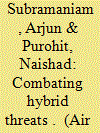

|
|
|
| 4 |
ID:
178557
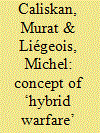

|
|
|
|
|
| Summary/Abstract |
Hybrid warfare has been a popular term that refers to contemporary warfare. Despite the increasing number of critiques, NATO has used the term in its strategic documents and summit declarations. Since concepts are important in shaping our understanding and the way that our forces fight, NATO’s use of a controversial concept has raised some questions. In this context, this paper aims to explore the meaning of the hybrid warfare from the viewpoint of NATO, based on in-depth interviews with NATO officials who have sufficient expertise and experience about the concept. The authors conclude that hybrid warfare is an ambiguous concept which clouds NATO’s strategic thinking and leads NATO to forget the difference between war and peace. Further analysis has revealed that NATO uses this concept as a tool for the strategic communication rather than a military concept.
|
|
|
|
|
|
|
|
|
|
|
|
|
|
|
|
| 5 |
ID:
188410
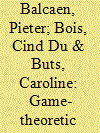

|
|
|
|
|
| Summary/Abstract |
For decades, the concept of deterrence and the fear for nuclear confrontation withheld large powers from waging aggression against each other. Recent technological developments and the growing interconnectedness however allowed some states to find ways to challenge the West by using so called ‘hybrid threats’. This way of waging war entails the synchronized use of a broad spectrum of instruments that are well-designed to stay below the thresholds of detection, attribution and retaliation. Combining these (relatively cheap) threats with conventional military hard power confronts the liberal democracies with a difficult choice in terms of defence budget allocation. Whereas arms race stability in the conventional and nuclear domain leads to a peaceful stalemate, this article demonstrates that adding hybrid threats to the spectrum of state power projection leads to a gradual shift of the power balance. While hybrid threats have been extensively studied within the international relations literature, we are (to the best of our knowledge) the first to study these changing security paradigms from a defence economic point of view. Moreover, this article is the first to represent this increasingly complicated state power competition in a game theoretic framework.
|
|
|
|
|
|
|
|
|
|
|
|
|
|
|
|
| 6 |
ID:
181661
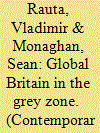

|
|
|
|
|
| Summary/Abstract |
The United Kingdom’s integrated defense and security review put “grey zone” or “hybrid” challenges at the center of national security and defense strategy. The United Kingdom is not alone: The security and defense policies of NATO, the European Union, and several other countries (including the United States, France, Germany, and Australia) have taken a hybrid-turn in recent years. This article attempts to move the hybrid debate toward more fertile ground for international policymakers and scholars by advocating a simple distinction between threats and warfare. The United Kingdom’s attempts to grapple with its own hybrid policy offer a national case study in closing the gap between rhetoric and practice, or stagecraft and statecraft, before an avenue of moving forward is proposed—informally, through a series of questions, puzzles, and lessons from the British experience—to help international policy and research communities align their efforts to address their own stagecraft-statecraft dichotomies.
|
|
|
|
|
|
|
|
|
|
|
|
|
|
|
|
| 7 |
ID:
189804
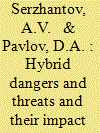

|
|
|
|
|
| Summary/Abstract |
This paper looks at new comprehensive dangers and threats and their impact on Russia's military security system.
|
|
|
|
|
|
|
|
|
|
|
|
|
|
|
|
| 8 |
ID:
096586
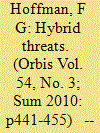

|
|
|
|
|
| Publication |
2010.
|
| Summary/Abstract |
Hybrid threats have now joined a growing suite of alternative concepts about the ever evolving character of modern conflict. Here and abroad, the hybrid threat construct has found traction in official policy circles despite its relative novelty. It has been cited by the U.S. Secretary of Defense in articles and speeches, and by policymakers now serving in the Pentagon. Heretofore, the rapidly growing hybrid threat literature has focused on the land warfare aspects of the threat. Modern hybrid threats, including Hezbollah and Iran, have demonstrated the ability to employ irregular tactics and advanced naval capabilities along with illegal or terrorist activity. Thus, the hybrid threat is applicable to naval forces and the U.S. Navy needs to dust off lessons learned from its last experience in the Persian Gulf in the late 1980s to better prepare for an even more challenging future.
|
|
|
|
|
|
|
|
|
|
|
|
|
|
|
|
| 9 |
ID:
118198
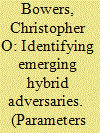

|
|
|
| 10 |
ID:
156858
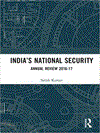

|
|
|
|
|
| Publication |
Oxon, Routledge, 2018.
|
| Description |
xx, 454p.hbk
|
| Standard Number |
9781138483118
|
|
|
|
|
|
|
|
|
|
|
|
Copies: C:1/I:0,R:0,Q:0
Circulation
| Accession# | Call# | Current Location | Status | Policy | Location |
| 059262 | 355.033054/KUM 059262 | Main | On Shelf | General | |
|
|
|
|
| 11 |
ID:
179098
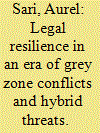

|
|
|
|
|
| Summary/Abstract |
The international system has entered a period of increased competition, accompanied by a steady retreat from multilateralism and international institutions. The purpose of this article is to place these developments within the context of three concepts that have risen to prominence in recent years: lawfare, hybrid warfare and grey zone conflicts. In doing so, the article makes three arguments. The instrumental use of international law for strategic purposes forms an integral feature of the international system. Although the notions of lawfare, hybrid warfare and grey zone conflict all contribute towards a better understanding of the instrumentalization of international law, neither offers a complete framework for analysis and for developing an appropriate policy response. The challenges posed by the instrumentalization of international law are therefore best countered by adopting a legal resilience perspective and by fostering an operational mindset.
|
|
|
|
|
|
|
|
|
|
|
|
|
|
|
|
| 12 |
ID:
167711
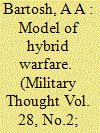

|
|
|
|
|
| Summary/Abstract |
The paper relies on formulated requirements for instrumental methods of reflecting modern conflicts to suggest a methodology of developing the hybrid warfare model whose algorithm is to take into account a nonlinear configuration of strategic forces and opportunities.
|
|
|
|
|
|
|
|
|
|
|
|
|
|
|
|
| 13 |
ID:
189456
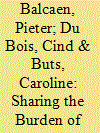

|
|
|
|
|
| Summary/Abstract |
This article discusses the effects of the changing (hybrid) conflict environment on the burden sharing debate. We discuss the actions taken by both the alliance as the member states in repelling these threats, arguing that this mainly produces security outputs that are private or impure public. As the burden sharing literature currently lacks notions of hybrid threats, we believe the current modelling to be ill-suited to provide reliable assessments of member states’ burden sharing behaviour. We address this void by adjusting the Joint Product Model, extending a country’s security activities to a more inclusive ‘whole of government (WoG) approach’. We depart from this WoG model to stress the challenges associated with comparing the contributions of member states in countering these threats. This leads us to dispute the use of aggregate military expenditures as a main variable to measure a country’s degree of free riding. More and other types of (non-military) variables and proxy-indexes should be taken into account. The same remark goes for estimating the benefit-burden concordance within this framework of permanent non-linear state competition.
|
|
|
|
|
|
|
|
|
|
|
|
|
|
|
|
| 14 |
ID:
164223
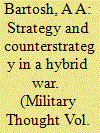

|
|
|
|
|
| Summary/Abstract |
This article examines the essence and content of the strategies and counterstrategies of the opposing sides when preparing and waging hybrid wars. It is shown that their logic should be built taking into account the nonlinear configuration of strategic forces and capabilities. Recommendations are given for neutralizing hybrid threats and organizing counteraction when a hybrid war against Russia is unleashed.
|
|
|
|
|
|
|
|
|
|
|
|
|
|
|
|
|
|
|
|
|